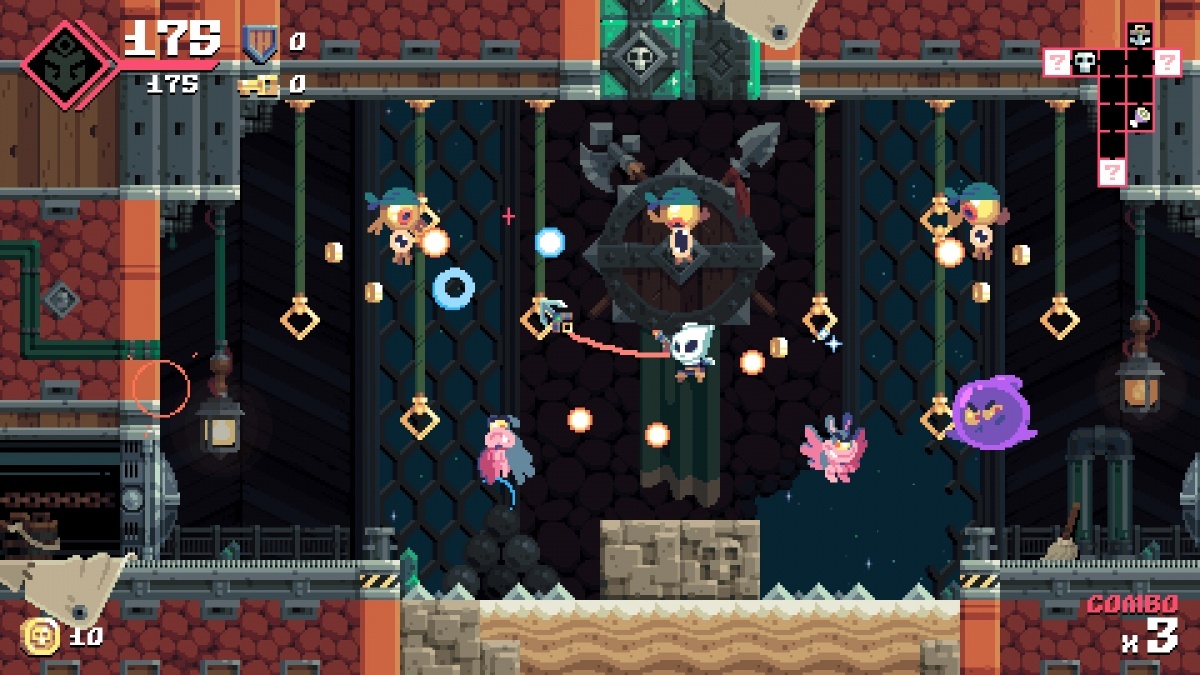Flinthook (Nintendo Switch) Review
By Coller Entragian  09.03.2018
09.03.2018

Tribute Games began its oeuvre with Mercenary Kings, which lived up to its namesake: a tribute to run and gun action titles. Its next project would be less of a tribute and more of an original idea that would rely on some overused indie game mechanics, like procedurally-generated levels. Much like its previous efforts, the team's sensibilities in pixel art and animation would be top notch. Does Flinthook lean on its art to mask a sub-par game? Can Tribute Games deliver something that plays as good as it looks? Cubed3 takes an in-depth look at the Switch conversion of Flinthook.
Procedurally-generated levels and roguelike elements have become one of the biggest and most overused clichés for indie game development. It seems like everything that is made from a small team has these randomised aspects in order to create the very thin illusion of replay value. The idea behind these concepts is to make it so that every time a game is played, no two sessions will be alike. The problem is that oftentimes these roguelike elements are used in a very shallow or superficial way that does not work with the game mechanics. In the case of Flinthook, the randomly generated levels make play sessions less interesting.

Flinthook is, mechanically, a very well-made title. The randomised levels work against what could have made the action very intense. Captain Flinthook controls very fluidly and has a wide variety of moves at his disposal. Being able to wall-jump, grapple, shoot, and even slow down time makes this Phantom Killer look-a-like a very versatile and fun character to play as. The little clansman can do so much and yet the procedurally-generated levels barely accommodate his cache of abilities. Tribute Games would have been better off designing the levels for leveraging Captain Flinthook's mobility. Once in a while, when the planets align on a Friday the 13th, Flinthook's algorithm for level layout may come up with something that is interesting and not feel like a logical computer spat it out.

As per usual, Tribute Games' sprite art and animation brings all the boys to the yard to ogle at. The designs and sense of style really helps Flinthook stand out and feel more fun to play. Everything feels very fluid and responsive, with no jitter or choppy animation. There is a lot of attention given to the way dust kicks up as characters leap, slide, and land on surfaces. These kinds of flourishes go a long way to add to the feedback of the action, giving a cartoony visceral impression. The backgrounds can be a bit too busy at times, making stages look like a cluttered mess, likely due to the algorithm for level generation. The art in this is too good for such a rookie mistake - this is something a cold and calculating computer would do. Right from the way the game begins and starts, the attract animation that opens is basically Tribute Games' guarantee that Flinthook is going to have some of the finest 2D sprites. It is disappointing that the entire game has to have a pirate level theme.

The way Tribute Games implements roguelike game design is mostly relegated to the fact the level design is done by an unintuitive computer. When Captain Flinthook dies, the only progress lost is that he must redo a gauntlet of stages to fight the boss again. This can be really annoying since there are no means to make any sacrifices of any kind to create a checkpoint; a hallmark of the roguelike sub-genre. All pick-ups and loot gathered along the way is kept, which is not something that is typical in roguelikes. It seems like the developer might have been stuck on deciding what would be more frustrating to players, and could not find a comfortable middle ground, so it had to choose between two bad options. Flinthook really needed to embrace some of the riskier game design philosophies that something like Rogue Legacy had down perfect. More options and opportunity to make interesting choices or sacrifices would have been appreciated and might have offset the fact that when playing it safe, Flinthook is a fairly tame action platformer.
Note: It has come to the attention of the author that Tribute Games' level design is not assembled by an algorithm, but actually designed by an actual level designer. It should be noted that the individually designed rooms are connected to each other via an algorithm. In accordance to this revelation, the integrity of the designs are still found wanting. In spite of the rooms being hand-crafted, the same flaws remain that the player-character's abilities are still stifled in otherwise unimaginative level design. It may not be the fault of a computerised random number generator, but rather the lack of imagination.
Anyone who has played Flinthook on other platforms will be getting the same exact experience on Switch. The only difference is that on Switch, the game can now be played anywhere, which means this is currently the best way to experience Tribute Games' space-faring opus. This is a very faithful port with no added features, as of now, and plays perfectly docked or in handheld mode.

Cubed3 Rating
Very Good - Bronze Award

Flinthook falls short of being amazing. It came so close and misses the mark because of the misguided reliance on procedural level design and timid approach to roguelike mechanics. This is still a pretty fun title with some very energetic and catchy music that makes the action feel exciting. The graphic and design work are amazing with tons of personality. The only place that the artists cut corners was that every stage is a pirate ship. Level design is hard, but leaving a computer to do it won't fix the problem - it only magnifies the lack of creativity. Captain Flinthook is a fun character to play as and the way the procedural levels are generated, they just do not do him justice.

![]() 7/10
7/10
![]() 0
(0 Votes)
0
(0 Votes)
 Out now
Out now  Out now
Out now  Out now
Out now  Out now
Out now Comments
Comments are currently disabled

 Sign In
Sign In Game Details
Game Details Subscribe to this topic
Subscribe to this topic Features
Features







 Top
Top

